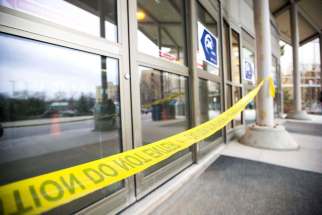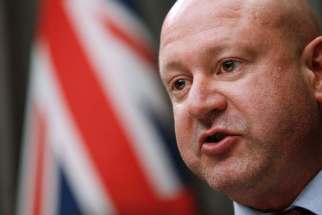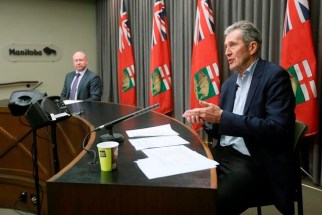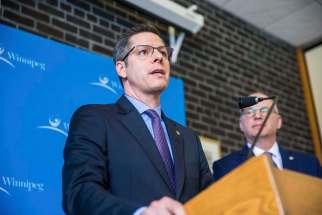Up close with Roussin: ‘no playbook to this’
Read this article for free:
or
Already have an account? Log in here »
To continue reading, please subscribe:
Monthly Digital Subscription
$0 for the first 4 weeks*
- Enjoy unlimited reading on winnipegfreepress.com
- Read the E-Edition, our digital replica newspaper
- Access News Break, our award-winning app
- Play interactive puzzles
*No charge for 4 weeks then price increases to the regular rate of $19.00 plus GST every four weeks. Offer available to new and qualified returning subscribers only. Cancel any time.
Monthly Digital Subscription
$4.75/week*
- Enjoy unlimited reading on winnipegfreepress.com
- Read the E-Edition, our digital replica newspaper
- Access News Break, our award-winning app
- Play interactive puzzles
*Billed as $19 plus GST every four weeks. Cancel any time.
To continue reading, please subscribe:
Add Free Press access to your Brandon Sun subscription for only an additional
$1 for the first 4 weeks*
*Your next subscription payment will increase by $1.00 and you will be charged $16.99 plus GST for four weeks. After four weeks, your payment will increase to $23.99 plus GST every four weeks.
Read unlimited articles for free today:
or
Already have an account? Log in here »
Hey there, time traveller!
This article was published 01/04/2020 (2081 days ago), so information in it may no longer be current.
Manitoba’s top doctor has appeared on televisions and smartphones every day for the past three weeks, steering the province’s response to the COVID-19 pandemic.
And at the end of each day, Dr. Brent Roussin is following his own social-distancing advice, hunkering down at home with his family, enjoying a meal and getting in a workout before the next day’s delivery of public-health news.
If life wasn’t as hectic, and if the pandemic hadn’t derailed the NHL season, he might have had time to check up on his favourite team. A “huge” Habs fan, he admits naming his son after Montreal Canadiens legend Guy Lafleur.
“Despite those long hours, I’m fortunate to have a lot of privilege in my life,” Roussin told the Free Press in a physically distanced phone interview.
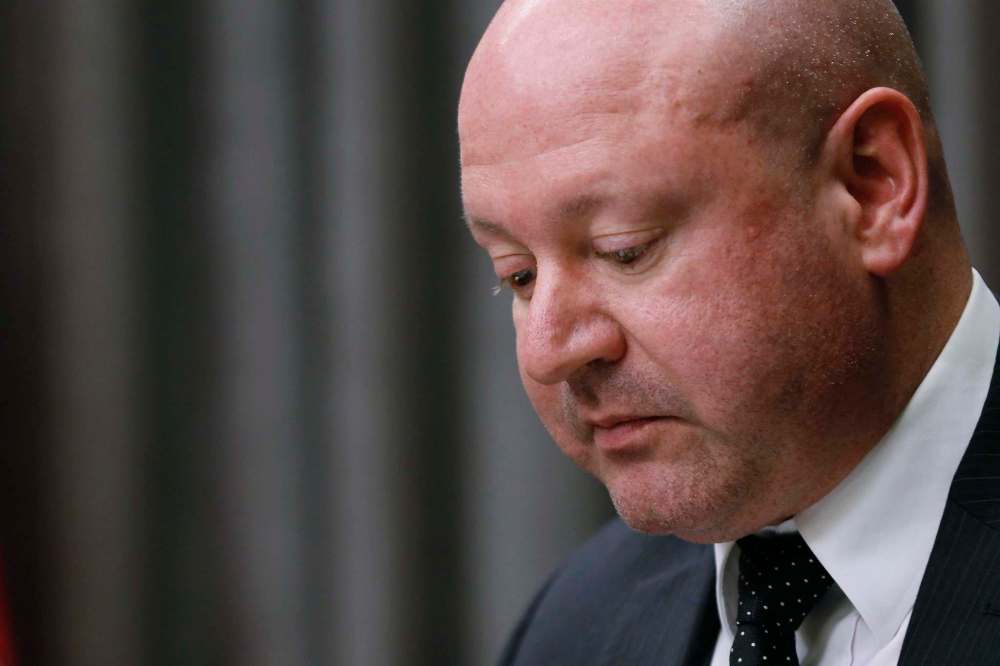
Roussin, 45, was named chief provincial public health officer last June, after years of treating patients in the north and studying law.
Lately, his mornings involve poring over provincial data on the coronavirus, and looking at modelling from afar. He touches base with regional and federal medical officers to monitor trends.
“Each pandemic is unique, and so we’re continuing to learn about this virus,” said Roussin, who also advises the Pallister government on how effectively its departments are responding.
“There’s no playbook to this,” he said.
“Each pandemic is unique, and so we’re continuing to learn about this virus.” – Dr. Brent Roussin
Roussin was raised in the Maples, and drawn to science and health as a kid. He finished medical school at the University of Manitoba in 2000.
Working as a family physician, including at a clinic in St. James, he immediately was struck by the social determinants of health, which is how factors like poverty, childhood development, stress from job insecurity and the environment shape someone’s well-being.
“The profession of medicine is the ability to apply knowledge to help others,” Roussin said.
That extends to public health, from analyzing trends to enforcing orders on the public.
“I became fascinated with the intersection of the law in medicine,” said Roussin, who went back to U of M, graduating with a law degree amid the 2009 H1N1 pandemic.
He focused on Manitoba’s north, working with the federal agency that administers nursing stations on First Nations reserves.
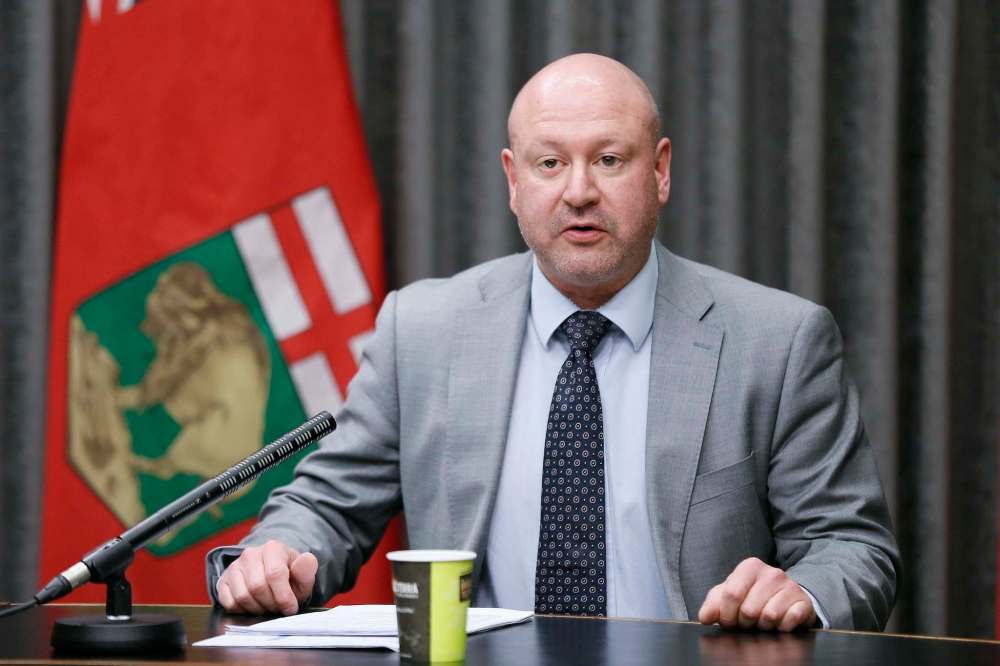
Those communities have a fraught relationship with the federal agency, which infamously sent body bags alongside supplies during the H1N1 outbreak.
Yet Roussin left a good impression on those communities, helping lead a COVID-19 preparedness workshop last month with Manitoba Keewatinowi Okimakanak. He said racism and poverty drive many of the medical conditions that make reserves so vulnerable to the coronavirus.
“I still have those relationships, that are quite beneficial at times like this,” Roussin said. “Some of the trust goes both ways.”
Dr. Mike Isaac, a provincial health officer for the north, said Roussin is among the few people cut out to be the top doctor, because he understands rural Manitoba, the north and downtown Winnipeg.
“He’s a very compassionate person and a deep thinker,” said Isaac, who was acting chief before Roussin’s appointment. “We’re just so fortunate to have Brent.”
“He’s a very compassionate person and a deep thinker. We’re just so fortunate to have Brent.” – Mike Isaac, a provincial health officer for the north
The job comes with a starting salary of $410,000 a year, and numerous powers under the Public Health Act.
Roussin can have Manitobans temporarily apprehended or detained for reasons that include testing people for an infectious disease, or to have their information recorded when arriving from abroad.
He can even mandate that someone be tested or quarantine themselves, and ask a judge to order that someone receive treatment if their infection puts public safety at risk. Such powers are used sparingly, and require detailed reporting to the health minister.
Roussin’s understanding of administrative law has come in handy, with the province enacting emergency measures it has never used for a public-health crisis.
“Having some of the legal knowledge helps with understanding some of the implications of policy,” he said.
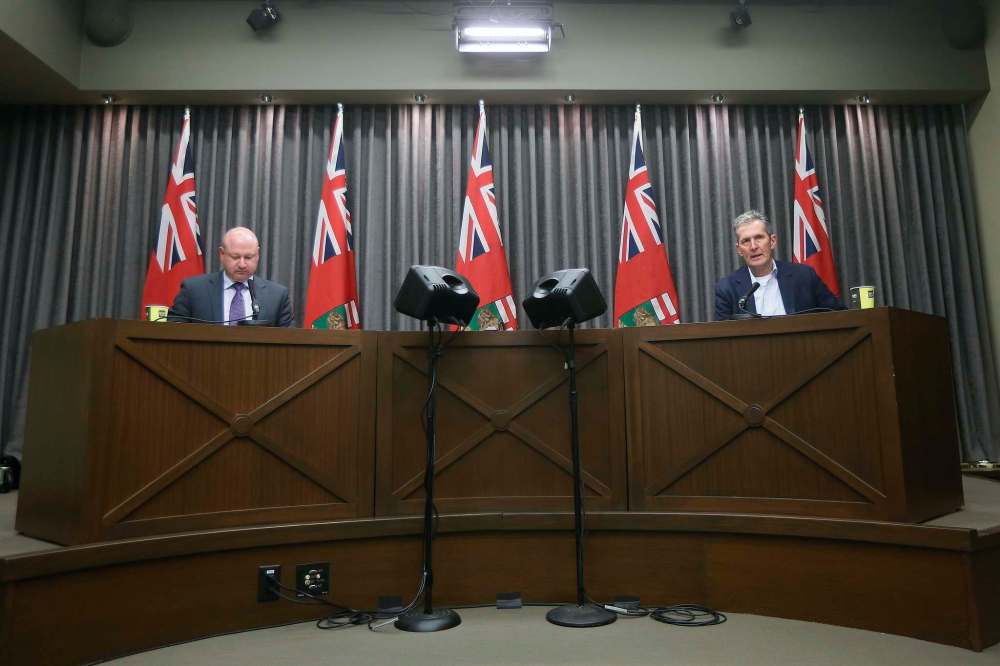
Just a few months ago, Roussin’s main focus was on sexually transmitted and blood-borne infections, particularly syphilis.
That meant keeping tabs on the spread of those diseases, and whether moves like peer-network programs and boosting access to needles has brought down infection rates. By law, he has to advise the health minister on any concerning trends.
Every five years, the top doctor submits a massive report on the health status of Manitobans, which is due Dec. 31.
Roussin said those tasks are still underway, “but certainly with COVID, it’s taken up much of our time.”
His job is to point out how factors like poverty shape Manitobans’ health, but not to prescribe policy solutions.
Amid Manitoba’s meth crisis, opposition parties have called for supervised injection sites, yet Roussin said he hasn’t advised the government on the merits and drawbacks of that approach.
“Having some of the legal knowledge helps with understanding some of the implications of policy.” – Dr. Brent Roussin
Since March 12, Roussin has held daily press conferences, each viewed online by thousands, alongside Lanette Siragusa, the chief nursing officer at Shared Health.
The pair have been made into online memes. In one, their heads are transposed onto the hosts of Body Break, the Hal Johnson and Joanne McLeod duo that offered physical fitness and nutrition tip on Canadian television in the late 1980s and early ’90s.
In recent days, Roussin has faced pushback from reporters over limiting the information about people who have contracted COVID-19. He isn’t fazed by being in the news, nor his current workload.
Instead, Roussin tries to keep a ritual of the family dinner every evening, including when he works late. He watches what he eats, and works out at home. His Twitter account reveals a deep passion for the Habs.
Isaac said public-health officials often neglect themselves during stressful periods, despite urging people to look after their needs.
“During this challenging and unprecedented time, he still has time to have a sense of humour and to reach out to colleagues and chat, and make sure they’re doing okay.”
dylan.robertson@freepress.mb.ca
History
Updated on Wednesday, April 1, 2020 7:39 PM CDT: Updates Habs reference

